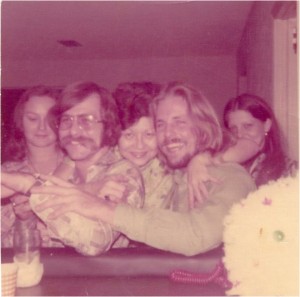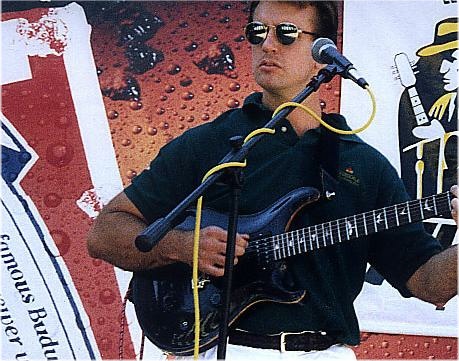I go deer hunting with my family every year, usually in Pennsylvania, one time to Montana for big game. This past season my older brother Greg brought a picture that he had found in the house my grandparents once lived in – he had bought the house from my grandmother a few years ago (darn good timing for her too, as housing values now can attest) and was remodeling it and found the picture.
In the picture were two of my uncles with their mother and their respective ex-wives. It was taken when we all still lived in Florida and I remembered the ‘look’ they had then; shaggy hair, wiry frames. Both my uncles played guitar and that is a formative impression on a young guy.
Is that Jimmy Buffett and one of the Allman brothers? Is it those guys from “Simon & Simon”? Nope, they are my uncles.
One of them even made it part of his career, playing bass with 1970s country bad boy Gary Stewart. I never understood the need for a bass guitar myself, but I basically taught myself to play an acoustic and then when I was in college at Duquesne in Pittsburgh I had a chance to learn from Joe Negri, maybe better known to people as Handyman Joe on Mister Rogers’ Neighborhood yet in reality a monstrously good jazz guitarist. Mr. Negri was a truly gracious teacher and likely suffered while he nodded and smiled as I botched numerous jazz standards. He was friends with jazz impressario Joe Pass and in 1984 when Joe came to town to do a charity event with Ella Fitzgerald and Andre Previn, I got a chance to have a Master Class with Pass, who was so good it almost made me give up guitar.
If I am good enough for all that, how can I botch music, you might ask? Playing in front of people is quite literally the only thing I get stage fright about. I am not sure why. I can stand in front of 200 Ph.D.s and make jokes without any concern at all yet playing music in front of strangers basically paralyzes me; yet if you walk in and I am playing, you might think I am pretty good until I notice you and stop. Kind of like that singing frog in the old Warner Bros. cartoon.
Yet when I was a young guy, my uncles were terrifically supportive when I saw them annually (we had moved to Pennsylvania and they came up for hunting) and my uncle Darrell’s eyes would light up when I played something – it didn’t matter what it was, you can always tell someone is a true music lover because it didn’t matter what someone was playing, if it was good or bad, the fact that they were playing was good enough.
For the bulk of the 1970s, FM was not how most people listened to radio, AM was. Purists listened to FM because it was more eclectic and if you were in a market that received a station, you might listen to an AOR (Album-Oriented-Rock) station because these people were real gurus who lived music – and they played and discussed albums instead of Billboard hits. After moving to Pennsylvania FM radio was tough to come by in the country but a shift was happening – FM had a clear signal and now more power to reach more people. AOR began to die but stations that focused on mixes (1) began to get huge. One time during a hunting trip I asked my uncle Darrell if he had any idea how to play Pure Prairie League’s “Amie” and he had heard the song but never played yet he sat down and just figured it out. Just like that. It was terrific. Then they all went off to a bar with a guitar so they could get free drinks in return for music. What a life. Being an adult sounded cool.
Yet I never got the hang of playing in front of people. In my late 20s I found out a fellow who worked with my mother was a huge Pittsburgh Steelers fan. My mom loved this guy and, since I was living in Pittsburgh, I wanted to take care of anyone who was helping my mother, so I got her address from him and put together a box of Steelers loot and sent it off. Out of the blue I get a call from this joyous New Jersey Italian guy and it turned out he played guitar. From then on, we made it an annual tradition (while I still lived in Pittsburgh) that he and his wife would come to town for a few days and we would go to a game. He also played guitar. Of course, I couldn’t really play in front of him then so I sent him a tape and this (as he turned out to be) virtuoso on guitar paid me one of the nicest compliments guitarist can get – “you can play with both hands”.
It wasn’t always them traveling to us. By the time I reached the age of 30, I felt like after 16 years of playing I was worthy of a good guitar. It helped that my kid knocked over the somewhat crappy guitar I had and broke the neck. The guitar I wanted in 1995 was a Taylor so I looked around Pittsburgh but the dealership in town was not that great; Taylor had always handmade their cases but the dealer wanted to give me some crappy generic case and told me they had ‘stopped’ making cases. So I called up my New Jersey Pittsburgh Steelers fan guitar-playing friend Joe Allocco and he told me to come out there. He knew he could get me whatever I wanted. So I went, I got the Taylor I wanted, and he had custom-built his own studio so I recorded some things in there as well.
Joe had a full-time job but he was also a music junkie. He kept a guitar in his office, he kept a guitar in his car – I kid you not, when traffic was heavy he would edge along the road steering with his knees and play – he kept a guitar in the bathroom. He told me on one trip that he had gigs so he would be gone at night, unless I wanted to come with him. If I wanted, he said, I could even sit in. I kind of laughed at that but agreed to at least go along. That Friday night, he played at a Red Lion lounge. There weren’t a lot of people there. “I could do this,” I thought, there’s nobody here. The Saturday gig was at something called Bar A, he told me, and it was all pop music stuff people wanted to hear, nothing difficult.
Not for him. But I don’t own an electric guitar and didn’t then(2), I mostly play classical and I have never used a monitor. It’s a lot of variables for a guy who likes to plan his chaos so it looks easy. Oh, and there is that stage fright thing.
We drive the next day, he plays the song I am going to do (“Mister Jones and Me” it turns out) and we arrive and start unloading his equipment and…this is nothing like a Red Lion Inn lounge. This is an outdoor stage; there are already a hundred people and it didn’t even start yet. I was now beyond jittery. Buying a guy who does not drink a beer always helps; after six ounces I will be telling a microphone I love it and it’s the best microphone ever.
How did I do? I probably botched the whole thing, I was in some terrified shell and can’t recall. I have MIDI tracks I am listening to, a singer, and I am trying to play lead guitar while listening to myself on a monitor while I endure stage fright. But Joe is no dummy, he is a student of history – he knew this would be a big deal and had brought a camera. So presented below is the only evidence I ever played on a stage:
The backdrop was this giant Budweiser logo. By the time I played, there had to be about a thousand people out there, which did not help my stage fright any.
NOTES:
(1) Also in 1984, my second year of college, I became program director for the internal radio station at Duquesne – not WDUQ, which was all classical, but the one that only played in the buildings. Two years later I would spearhead the effort to get a low power college station that was actually college radio but in 1984, having been a DJ the previous year, I got the job as program manager. Knowing nothing about programming music, I called up all of the big stations in Pittsburgh and asked to speak to their program director’s, notably WDVE and WBZZ (WBZZ was top 40 then – it is no longer in Pittsburgh, it seems). The program managers on the phone sounded a lot like you would expect, WDVE was a rock station and had a harder-edged guy who had little interest in me (but he called me back – which counts for a lot too) while the WBZZ program manager was more polished. He was intrigued that I (a) got the job without knowing how to do it and then (b) shamelessly called up the biggest station in the city to get free advice on how to do it. “I’ll teach you,” he said, “but I want you to come work for me as an intern. It will be a lot of sorting records but you will learn what you need to learn.” And he did teach me; since radio was still a creative process and DJs were personalities, they didn’t want to force them to play anything, so he had created what I called a ‘Lucky Charms’ box. It had color-coded notecards in a recipe box and then each card would have a shape at the top – a star, a moon, a heart. Each card had a list of songs. DJs were given a list of colors and shapes they had to use but the choice of songs was up to them. The songs, of course, were chosen to appeal to their demographic at various periods of the day – it was applied science and It was brilliant. Maybe stations still use it today, I have no idea. But they should. My work there also got me introduced to the folks at College Media Journal, which meant a ton of free records too. I knew after the internship I didn’t want to do radio as a career – the world of “WKRP In Cincinnatti” was fading fast, that writing was on the wall – but I loved my time there. Thanks, Guy Zapoleon, for giving a young guy a chance!
(2) However, he has a Paul Reed Smith custom 22 that had better be in his Will listed as going to me, should he precede me in death. If not, this 1968 Martin he wants is going to one of my kids instead. Plus, I technically do own an electric acoustic – the first guitar I ever bought myself was a Teisco Del Rey surf music guitar, tremolo bar and all, from my high school friend Tim.


